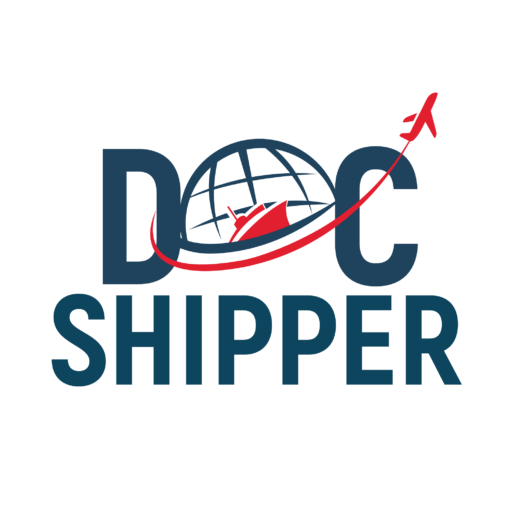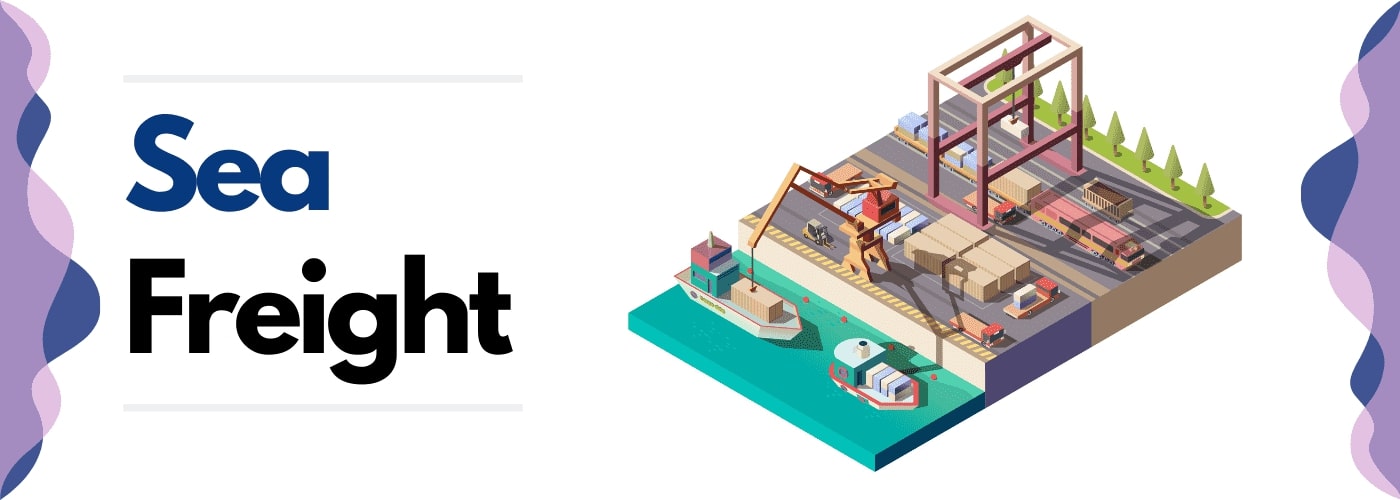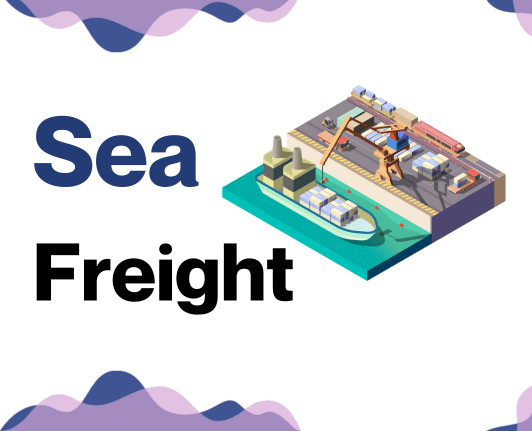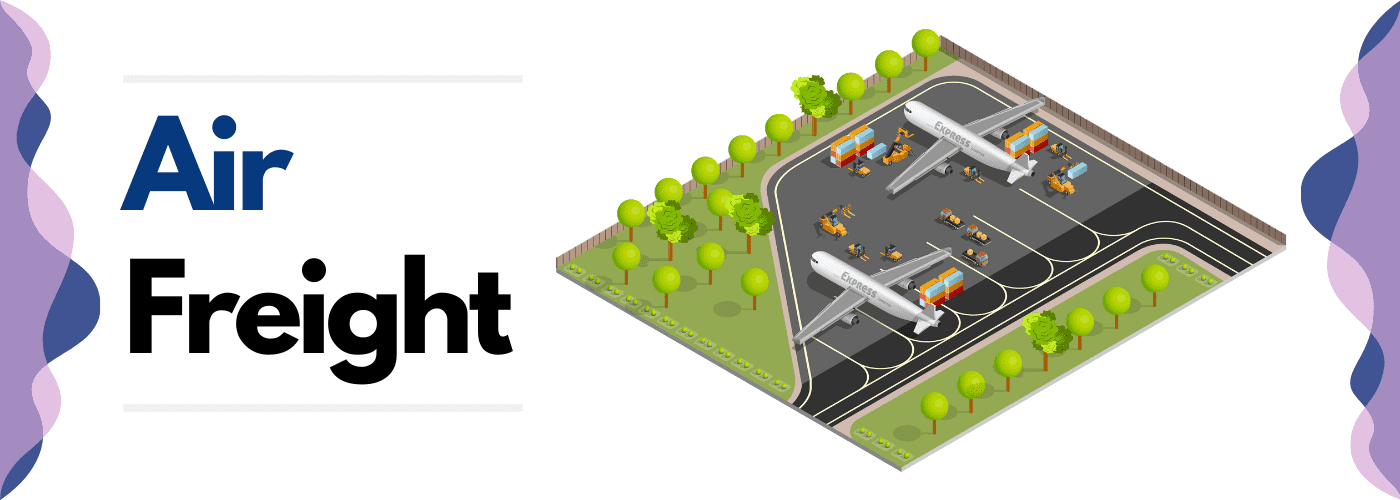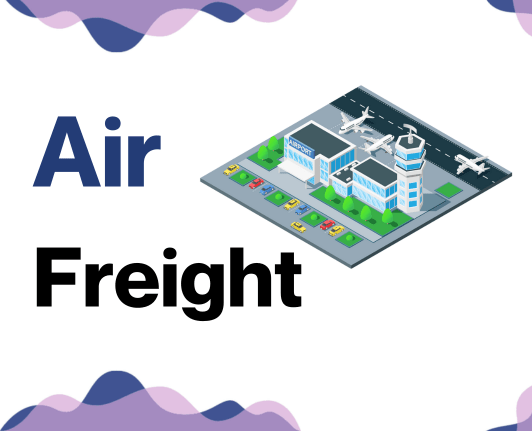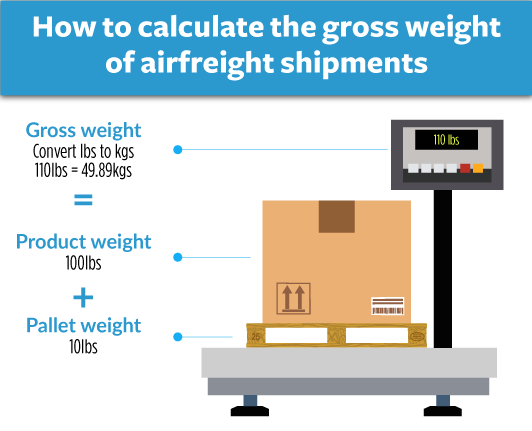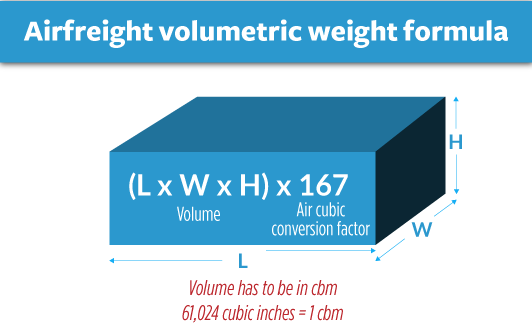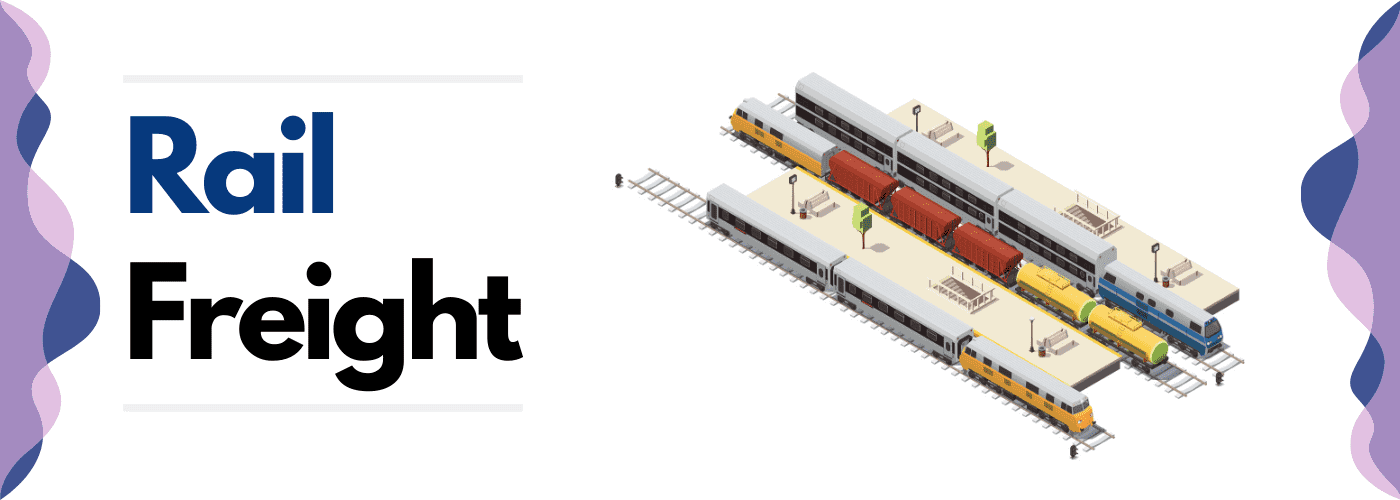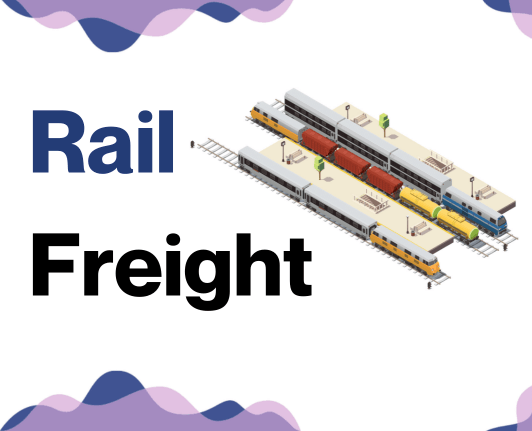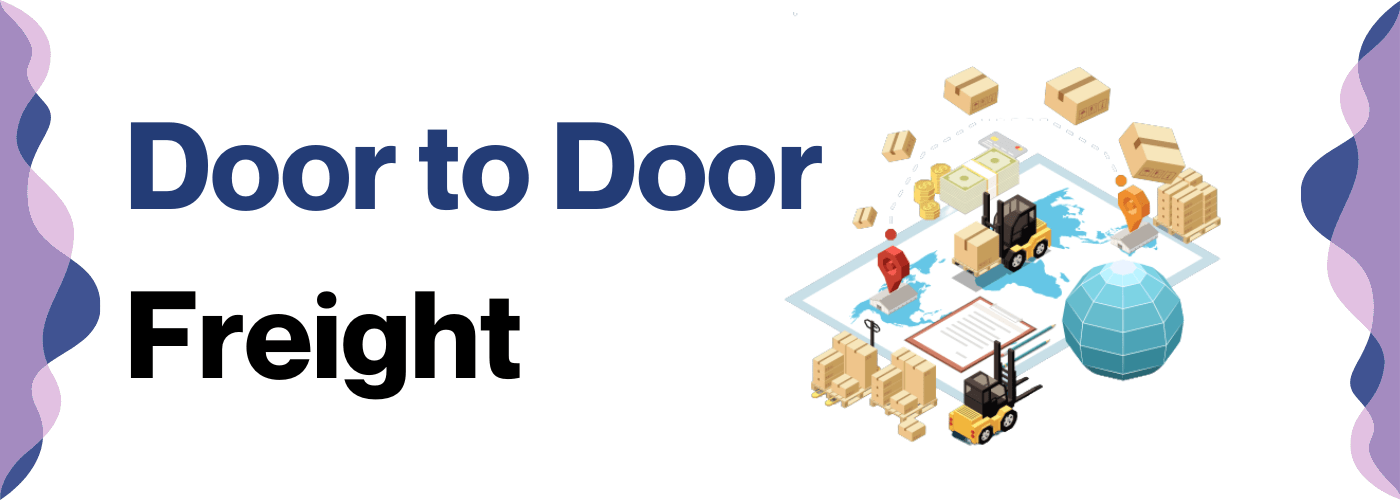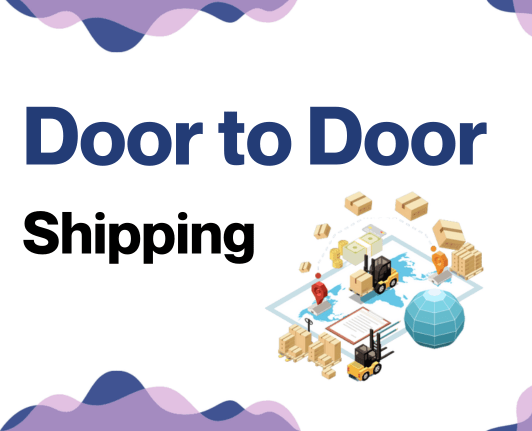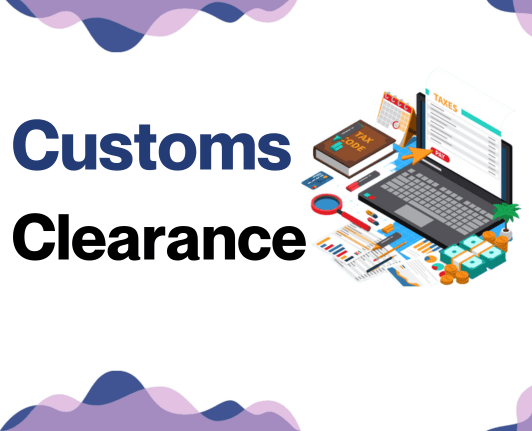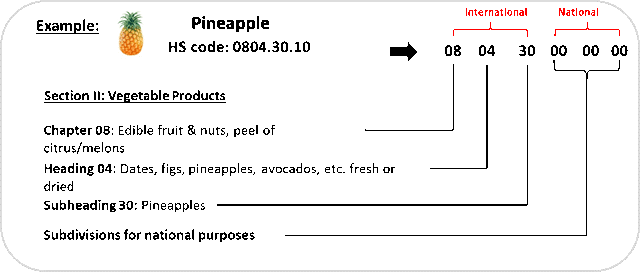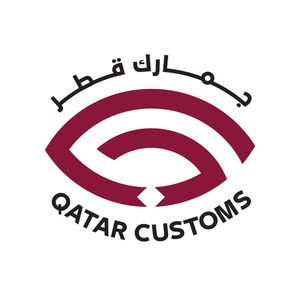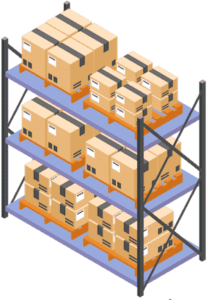Who knew shipping freight from Qatar to Switzerland could be as smooth as Swiss chocolate if you know the way around? The process could become tricky due to factors such as fluctuating rates, varying transit times, and a labyrinth of customs regulations. This guide aims to simplify things by equipping you with all the vital information like different freight options, an understanding of customs clearance, duties, taxes, and more.
It provides tailored advice to meet your business need and helps you see through the fog of complex international shipping. If the process still feels overwhelming, let DocShipper handle it for you! As an all-inclusive international freight forwarder, we take care of every step of your shipping endeavor, turning potential challenges into guaranteed success.
Which are the different modes of transportation between Qatar and Switzerland?
Understanding the best transportation between Qatar and Switzerland is a bit like planning a long-distance journey. Air and sea are the main options, as they lie over 3000 miles apart, with many countries in-between. Picture a direct flight versus a cruise through changing seas - both have their charm. Air freight is fast but costly, while sea freight is economical and ideal for large, heavy shipments. The choice relies on your cargo type, budget, and urgency. It's all about picking the most efficient route for your own shipping expedition. Just like a traveler, every consignment has unique needs.
How can DocShipper help?
Facing challenges with your freight from Qatar to Switzerland? Lean on DocShipper! Our expert team handles everything from transport organization to customs clearance, simplifying the process for you. Got a pressing query? Dial our consultants anytime, free of charge. To get your free estimate in less than 24 hours, reach out now!
DocShipper Tip: Sea freight might be the best solution for you if:
- You're dealing with hefty quantities or large-scale goods. Sea freight is your go-to for maximizing space without stretching your budget.
- Your cargo doesn't have an urgent deadline, as sea freight typically has longer transit times compared to air or rail.
- Your shipping routes are between major ports, allowing you to leverage the extensive global network of sea shipping lanes.
Sea freight between Qatar and Switzerland
Efficiently shipping goods between Qatar and Switzerland can seem like plotting a transcontinental chess game. With busy cargo ports like Hamad in Qatar and Basel in Switzerland serving as critical junctures, sea freight can be a smart move for high-volume shipments. Why? Simply because it combines economy and capacity in a way no other shipping method can match. But it comes at the cost of time. It's the tortoise in the hare-tortoise story, steady but slow.
Yet, the real test often lies in understanding the complex rules and best practices of shipping between these two nations. Businesses often find themselves tangled in the labyrinth of policies and paperwork, adding to the time and cost. It's like trying to decode a Rubik's cube, wondering which step leads to the right color on each side. This guide is here to turn these challenges into smooth sailing, offering you the compass of experience to navigate, minus the usual mistakes and delays. Just read on, and you'll soon see why the sea isn't as mysterious as it appears.
Main shipping ports in Qatar
Hamad Port
Location and Volume: Located at Umm Al-Houl, south of Doha in Qatar, Hamad Port is the largest in the country. This port is essential for petrochemical and other industrial product exports. With a shipping volume of over 2 million TEU, it's key to the Qatari economy.
Key Trading Partners and Strategic Importance: Key trading partners include India, China, the United States, and the United Arab Emirates. Having a container terminal, a general cargo terminal, and a livestock terminal, it has strategic importance as the country's vital maritime shipping gateway. Hamad Port's location facilitates easy access to Qatar's substantial gas reserves.
Context for Businesses: If you're looking to move large volumes of cargo, given its vast shipping volume and capacity to handle large carriers, utilizing Hamad Port could prove to be an essential part of your logistics strategy.
Doha Port
Location and Volume: Situated in the heart of Doha, the capital city of Qatar, Doha Port is primarily a passenger and military port, with a lesser degree of commercial shipping. It facilitates crucial passenger connections along the Qatari coast.
Key Trading Partners and Strategic Importance: Although it's not a primary venue for large-scale commercial trade, it maintains a significant role with respect to intra-regional passenger transport and military uses.
Context for Businesses: If your business caters to passenger transportation or military-related goods, Doha Port provides required facilities and connectivity. Its location in the capital city makes it easily accessible, proving to be convenient for businesses with specific shipping needs.
Ras Laffan Industrial City
Location and Volume: Located in the northern part of Qatar, Ras Laffan Industrial City is home to the Ras Laffan Port, a purpose-built harbour for the export of liquefied natural gas (LNG) and gas-to-liquid products.
Key Trading Partners and Strategic Importance: The port is notable for LNG exports to countries like Japan, South Korea, India, and China. Its strategic importance lies in its function as Qatar's primary outlet for its vast gas reserves.
Context for Businesses: For businesses in the energy sector, specifically those dealing with LNG and gas-to-liquid products, Ras Laffan Port is perfect for your needs, given its dedicated and purpose-built facilities.
Main shipping ports in Switzerland
Port of Switzerland
Location and Volume: Situated in Basel, Switzerland's busiest port is the Port of Switzerland, located where the river Rhine crosses the German, French, and Swiss borders. This port is essential for its strategic location, providing the most direct route from the North Sea to Switzerland. It boasts a shipping volume of over 6 million tonnes per annum.
Key Trading Partners and Strategic Importance: The port has a longstanding trading partnership with countries in Northwestern Europe, particularly Germany and the Netherlands. It's also vital for its ability to handle multi-modal cargo, accommodating road, rail, and water transportation.
Context for Businesses: If you're looking to connect with markets in Northwestern Europe, the Port of Switzerland could prove to be a pivotal part of your logistics strategy, given its robust multi-modal cargo management capabilities and direct access to the North Sea.
As Switzerland is a landlocked country, the Port of Switzerland in Basel is the country's principal and only major international port. It uses the Rhine River as a direct link to major ocean ports in Northwestern Europe.
Please note that while the Port of Switzerland is the only significant port, the country has an extensive rail and road network for intregrated logistics and efficient ground-transport options. Many goods are transferred from ocean ports in nearby countries such as Italy, France, and Germany to Switzerland via these networks.
Should I choose FCL or LCL when shipping between Qatar and Switzerland?
Sea freight between Qatar and Switzerland represents a logistical chess game, where each move can sway the balance of cost, timing, and success. Unraveling the threads of Full Container Load (FCL) and Less than Container Load (LCL) - also known as consolidation - is crucial. This indispensable guide serves to empower you with the right choice tailored to your shipping needs. Ready to delve in and unlock the mysteries of FCL and LCL?
LCL: Less than Container Load
Definition: LCL (Less than Container Load) shipping, or consolidation, is a method where multiple shippers with smaller cargoes share a container, often an affordable option given you're only paying for the space your goods occupy.
When to Use: LCL shipment is a smart choice if your cargo volume is not mass enough to fill a full container, typically less than 13/14/15 CBM. This flexibility allows smaller volume shipments to run more frequently and not be held up waiting for enough product to fill a full container.
Example: Imagine you're shipping artisanal Swiss chocolates to a Qatari retailer. Due to the chocolates' perishability and high value, shipping small batches more frequently using LCL freight would ensure freshness, reduce storage costs, and maintain customer satisfaction.
Cost Implications: LCL shipping quote often involves lower upfront costs compared to full container rates. However, keep in mind that LCL shipments might have additional charges such as deconsolidation or handling fees upon arrival. These costs vary depending on the size and weight of your shipment. So it's crucial to evaluate the overall logistics expenses against your unique shipping requirements.
FCL: Full Container Load
Definition: FCL (Full Container Load) shipping, as the name suggests, involves chartering an entire container - be it a 20'ft or 40'ft container - for transporting goods. It's a prime choice for large volume shipments.
When to Use: FCL shipping is a more economical and safer option when you're shipping high-volume goods, typically more than 13/14/15 CBM. Your goods stay sealed within the FCL container from origin to destination, enhancing the security of your cargo.
Example: Imagine running a business that supplies luxury watches from Qatar to high-end stores in Switzerland. Given the volume and value of goods, opting for an FCL shipping quote would ensure your watches are transported safely in one dedicated container, without the risks associated with sharing space.
Cost Implications: While acquiring an FCL shipping quote might reveal higher upfront costs compared to LCL (Less than Container Load), it's generally cheaper per unit for larger shipments. Also, there are less handling charges due to fewer hand-offs, making FCL cost-efficient for larger consignments. Note, however, you'll still be paying for the entire container space, even if it isn't fully utilized.
Unlock hassle-free shipping
Choosing between consolidation and a full container shipment for your Qatar-Switzerland route can be complex. At DocShipper, we turn these difficult decisions into smooth sailing by providing top-notch ocean freight services. Our professionals factor in the nature, size, and urgency of your cargo to select the most efficient and cost-effective solution. Why gamble with your international trade? Let DocShipper guide your journey. Reach out now for a free and accurate estimation tailored to your needs.
How long does sea freight take between Qatar and Switzerland?
On average, sea freight between Qatar and Switzerland can vary widely. These times hinge on various factors, including the specific ports utilized, the weight, and the nature of the goods being transported. For a more precise quote tailored to your needs, it's recommended to consult a freight forwarder like DocShipper.
How much does it cost to ship a container between Qatar and Switzerland?
Determining a precise cost to ship a container between Qatar and Switzerland is tricky. Roughly speaking, you could anticipate shipping rates in the ballpark of many hundreds to even several thousand dollars per CBM. This broad range is dependent on many variables, from the Point of Loading and Destination, the chosen carrier, the type of goods, to constant monthly market fluctuations.
But, don't let this uncertainty daunt you. Our capable shipping specialists are ready to delve into your unique requirements; they'll scrutinize these aspects and more to give you the most accurate ocean freight rates possible. Remember, we quote case-by-case basis, ensuring we tailor the shipping cost to your individual needs. Trust in our expertise; we'll guide you every nautical mile of the journey.
Special transportation services
Out of Gauge (OOG) Container
Definition: OOG containers are specialized containers for any content that cannot fit within the dimensions of standard containers due to their size or shape.
Suitable for: Oversized equipment, large machinery parts, or bulky construction materials.
Examples: Industrial machinery, wind turbine parts, and large vehicles are typical cargos shipped using OOG containers from Qatar to Switzerland.
Why it might be the best choice for you: If your cargo doesn't fit within the confines of a standard container due to its size or unique structure, the out of gauge cargo option is likely your best choice, ensuring safe and secure shipping.
Break Bulk
Definition: Break bulk refers to goods needing to be loaded individually, not in containers, generally because they're large or heavy.
Suitable for: Large items that can't be transported in a container.
Examples: Steel beams, wood logs, and construction equipment are examples of break bulk often transported from Qatar to Switzerland.
Why it might be the best choice for you: Break bulk is ideal if you're shipping large items that are easily handled individually, or loose cargo loads which do not fit into standard containers.
Dry Bulk
Definition: Dry bulk is a term used to describe goods that are shipped in large quantities, without packaging, and are usually poured directly into the cargo space.
Suitable for: Commodities that are shipped en masse.
Examples: Grains, coal, and minerals are commonly shipped as dry bulk from Qatar to Switzerland.
Why it might be the best choice for you: If you're moving large volumes of a single unpackaged commodity, consider using the dry bulk shipping option.
Roll-on/Roll-off (Ro-Ro)
Definition: Ro-Ro vessels are ships designed to carry wheeled cargoes, such as cars, trucks, semi-trailer trucks, trailers, and railroad cars, that are driven on and off the ship on their own wheels.
Suitable for: Any cargo on wheels or tracks that can be driven on and off the ship.
Examples: Cars, buses, trucks, and construction machinery are often shipped via Ro-Ro vessels between Qatar and Switzerland.
Why it might be the best choice for you: If your business involves the transport of vehicles or heavy machinery, the Roll-on/Roll-off method can be efficient and affordable.
Reefer Containers
Definition: Reefer containers are temperature-controlled containers used for the transport of perishable goods.
Suitable for: Food items, pharmaceuticals, and other temperature-specific commodities.
Examples: Meat, fruits, chocolates, and medicines are examples of items transported using reefer containers from Qatar to Switzerland.
Why it might be the best choice for you: If your commodities require a certain temperature to maintain their quality during transit, reefer containers provide the necessary conditions.
Understanding your shipping options between Qatar and Switzerland is vital to ensuring your goods arrive safely at their destination. Whether you need an OOG container or a reefer container, DocShipper has the expertise to assist you in making the right decision. Contact us today for a free shipping quote in less than 24 hours.
DocShipper Tip: Air freight might be the best solution for you if:
- You're up against the clock or have a non-negotiable delivery date. Air freight is your fastest bet for meeting tight timelines.
- Your shipment is on the smaller side, falling below 2 CBM. Air freight is particularly well-suited for compact cargo loads.
- Your goods are destined for locations that aren't well-served by maritime or rail options. Air freight expands your reach by connecting you to a vast array of international airports.
Air freight between Qatar and Switzerland
When transporting precious cargo from Qatar to Switzerland, air freight is a brilliant choice. Like a fleet-footed postman, it's quick, reliable, and surprisingly cost-effective for those small, valuable packages - think Rolex watches or rare Persian rugs. Yet, shippers often stumble, turning a simple dash into a financial hurdle race. Mistakes such as misjudging how freight weight impacts cost or missing out on industry best practices can make your wallet bleed. Let's untangle these complexities, learn from others' slip-ups, and make your air freight journey more like a smooth flight on a private jet, rather than a turbulent budget airline chaos.
Air Cargo vs Express Air Freight: How should I ship?
Swiss watches or Qatari gas equipment, whatever your business, selecting the right air shipping method between Qatar and Switzerland can be tricky. Simplifying it, think of air cargo travels in the belly of commercial airlines, while express air freight directs your goods on a dedicated aircraft for faster delivery. Let's dive into the pros, cons, and considerations to kick the confusion out of shipping.
Should I choose Air Cargo between Qatar and Switzerland?
The use of air cargo between Qatar and Switzerland provides a cost-effective, reliable, yet slightly longer transit time due to fixed schedules. Carriers such as Qatar Airways and SWISS International Air Lines offer high-quality freight services between the countries. The cost-effectiveness of air cargo intensifies if your load is over 100/150 kg (220/330 lbs), making it an increasingly attractive option. Visit Qatar Airways and SWISS Airlines to explore their services. If budgetary considerations top your priority list, air cargo might be the best choice for you.
Should I choose Express Air Freight between Qatar and Switzerland?
Need speed and reliability in shipping your cargo under 1 CBM or 100/150 kg (220/330 lbs) from Qatar to Switzerland? Express Air Freight, a service dedicated solely to cargo, free of passengers, might be your solution. With major couriers like FedEx, UPS, and DHL, you guarantee swift, dependable delivery for light cargos. Choosing these powerful players in global logistics ensures your shipment gets the attention it needs. Opt for express air freight to prioritize your delivery without delaying your business growth.
Main international airports in Qatar
Hamad International Airport
Cargo Volume: Over 2 million tonnes per year.
Key Trading Partners: United Arab Emirates, China, United States, Hong Kong, and Germany.
Strategic Importance: Hamad International Airport serves as one of the busiest cargo hubs in the Middle East. Its strategic geographic location at the crossroads of Asia, Africa, and Europe allows it to provide excellent connectivity for shipments to over 160 destinations worldwide.
Notable Features: The Cargo Terminal boasts an annual capacity of 1.4 million tonnes and offers dedicated facilities for temperature-sensitive goods, livestock, and dangerous goods. Moreover, the airport's superior infrastructure facilities efficiently streamline cargo operations.
For Your Business: Hamad International Airport could offer streamlined logistics for your goods, especially if your business frequently trades with the Middle East, Asia, or Europe. The airport’s cargo-handling capabilities across various types of goods, from perishables to high-value items, enable it to cater flexibly to your shipping needs. Additionally, with its around-the-clock operations, your cargo can be transported efficiently at any time.
Al Udeid Air Base
Cargo Volume: Not officially published.
Key Trading Partners: Primarily supports U.S. Military operations.
Strategic Importance: Al Udeid Air Base is home to the largest concentration of U.S. military personnel in the Middle East. Therefore, it plays a significant role in strategic cargo movement for the U.S. Military.
Notable Features: While its primary function is military, it has the capacity to handle large volumes of cargo and provides a unique access point to Middle Eastern countries.
For Your Business: Though primarily a military airbase, companies supplying the U.S. Military might find Al Udeid Air Base a crucial part of their logistics and shipping strategy, ensuring swift and secure transportation of goods.
Main international airports in Switzerland
Zurich Airport
Cargo Volume: About 490,000 tons annually.
Key Trading Partners: Primarily Europe, USA, China, and Middle East.
Strategic Importance: As the largest international airport in Switzerland, it plays a significant role in linking the Swiss market with global trade routes.
Notable Features: Known for its advanced cargo handling services, with well-structured facilities and designated zones for various types of goods.
For Your Business: The high-volume capability and strategic location of Zurich airport offer your business access to fast, efficient, and reliable air freight routes, connecting to key trading partners.
Geneva Airport
Cargo Volume: Handles approximately 90,000 tons of cargo per year.
Key Trading Partners: Particularly strong links with Europe, North America, and Asia.
Strategic Importance: Located near the French border, the airport's prominence is doubled by the proximity to several European markets and its status as a hub for numerous airlines.
Notable Features: Features a dedicated freight terminal with modern handling equipment, and parking bays for both Narrow Body and Wide Body aircraft.
For Your Business: Its strategic location and diverse freight handling capabilities make Geneva Airport an optimal choice for businesses targeting European and cross-Atlantic markets.
EuroAirport Basel-Mulhouse-Freiburg
Cargo Volume: Processes over 110,000 tons of freight annually.
Key Trading Partners: Primarily Europe, North America, and East Asian countries.
Strategic Importance: Being a binational airport, it contributes significantly to the optimization of logistical chains in the three-country region.
Notable Features: Offers both regular cargo flights and charter solutions, with modern facilities for airborne cargo processing.
For Your Business: With an integrated connection to major economic regions and dedicated cargo terminals, EuroAirport can serve as a core node for your business's logistic network, ensuring the swift and efficient transport of goods.
Lugano Airport
Cargo Volume: Around 10,000 tons of cargo each year.
Key Trading Partners: Mainly Europe, mainly Italy and Eastern Europe.
Strategic Importance: Though smaller in size, Lugano Airport offers a key air link to Southern Switzerland and Northern Italy, a strategic gateway to Italian-speaking markets.
Notable Features: Simplified cargo procedures and a wide range of handling services for different types of freight, including perishable and valuable goods.
For Your Business: Especially beneficial for businesses with cargo flows to and from Northern Italy, providing a viable alternative route with quick custom procedures and lower congestion.
Bern Airport
Cargo Volume: Deals with a smaller volume, focused more on special cargo.
Key Trading Partners: Mainly operates within Europe.
Strategic Importance: Bern Airport serves as an important regional hub, facilitating air freight services primarily for Swiss and neighboring German markets.
Notable Features: Boasts a streamlined cargo clearance process and fast delivery times, with capabilities to handle special cargo like high-value goods and pharmaceutical products.
For Your Business: The rapid handling and delivery services diverge from conventional bulk cargo operations, offering your business the flexibility to transport time-sensitive or special goods with efficiency and reliability.
How long does air freight take between Qatar and Switzerland?
The average air freight shipping time between Qatar and Switzerland is typically around 3-5 days. However, it's worth noting that this duration may change depending on factors such as the specific airports involved, the weight of your shipment, and the nature of the goods you're shipping. To get an exact estimate of your shipping time, a consultation with a specialized freight forwarder such as DocShipper is highly recommended.
How much does it cost to ship a parcel between Qatar and Switzerland with air freight?
When shipping air freight from Qatar to Switzerland, expenses can range broadly, averaging between $1.5 to $4.5 per kilogram. However, consider this a rough guide. Numerous factors, from proximity to airports, parcel dimensions and weight, to the nature of the goods, can influence the cost. As freight forwarders, we offer a tailored approach on each assignment offering competitive pricing. Hence, for the most accurate and competitive quote, please don't hesitate to reach out. Remember: You could get your free quote in less than 24 hours. Let's discuss your needs and find the best solution. Contact us now!
What is the difference between volumetric and gross weight?
In air freight shipping, gross weight refers to the entire weight of your shipment, including packaging and pallets. Meanwhile, volumetric weight measures how much space your shipment occupies in the cargo hold.
Calculating each in Air Cargo and Express Air Freight is quite straightforward. Gross weight is simply measured on a scale in kilograms (kg). Volumetric weight requires a bit more math, but nothing too complex. Here, the dimensions of the shipment are essential. You calculate it by multiplying the length (in cm), width (in cm), and height (in cm) of your package, then divide the total by 6000 for air cargo or 5000 for express air freight to get the volumetric weight in kg.
For instance, let's say you are shipping a package from Qatar to Switzerland that measures 50cm x 50cm x 50cm and weighs 30kg. The volumetric weight for air cargo would be (50x50x50) / 6000 = 20.83kg (or 46 lbs), while for express air freight, it would be (50x50x50) / 5000 =25kg (or 55 lbs).
Why does understanding these terms matter? Simply because freight charges are generally based on the greater of the two weights. In our example, freight charges would be calculated based on the gross weight of 30kg for air cargo or the volumetric weight of 25kg for express air freight. So, knowing your shipment's gross and volumetric weights not only helps in cost estimation but also in making effective logistics decisions.
DocShipper tip: Rail freight might be the best solution for you if:
- You are looking for a cost-effective transportation method for large volumes.
- Your shipping route is well-connected by rail, providing a reliable and environmentally friendly option.
- Your cargo's destination and origin are near rail terminals, minimizing the need for additional road transportation.
Rail freight between Qatar and Switzerland
Did you know locomotives could be just as adventurous as sea captains and aviators? Well, when it comes to shipping goods from Qatar to Switzerland via rail, there's an entire saga!
Established in the late 1990s, these railroads have been weaving stories of trade and economic cooperation through countries like Turkey and Germany. Packed primarily with textiles, machinery, and chemical products, these trains deliver more than just goods—they bring economic synergy!
Yes, rail freight takes longer than air transport, and slightly less than sea freight, but it's a superbly cost-effective option for bulk delivery. Yet, prepare to have your patience tried with complex customs procedures and potential bureaucratic snags along the way.
Deciding if rail freight fits your business puzzle? Look beyond 'fastest' or 'cheapest', and consider 'effective'. After all, there's no one-size-fits-all in the world of trade. Dive deeper, weigh your options, and let the most suited mode of transport win!
What are the main train stations between Qatar and Switzerland?
Cargo Train Stations in Qatar:
Ras Laffan Industrial City
This station is integral to Qatar's rail freight network. Based within the largest energy-producing hub in the nation, it offers significant cargo volume capacity for energy and industrial-based goods. For your business, this could provide an ideal platform for reliable, large scale shipments.
Mesaieed Industrial City
A well-connected hub with direct freight lines to key trading partners in Asia and Europe. Its strategic location near the major port city allows effortless transition from rail to sea freight. Its facilities can handle diverse types of cargo, fitting perfectly into your diversified shipping strategy.
Cargo Train Stations in Switzerland:
Zurich Hauptbahnhof
This is one of the largest railway stations in Europe, processing high cargo volumes daily. With connections to neighboring countries, it is perfect for businesses trading within the European market. Its advanced facilities ensure your goods are handled professionally and securely.
Geneva Cornavin
This hub extends your reach right into the heart of the European continent and beyond. Lying at the crossroads of several international routes, it can serve as a great solution for multi-country supply chains.
Basel Badischer Bahnhof
Situated near the Rhine River, it offers a unique multimodal cargo transfer solution. Its freight traffic primarily caters to Switzerland's key trading partners, Germany, Italy, and France, making it advantageous for businesses with an EU focus.
Lugano Stazione
As the closest Swiss train station to Italy, it is crucial for businesses involved in Swiss-Italian trade. Capable of handling a variety of goods, this hub can be the lynchpin of your rail shipping strategy for southern Europe.
Each of these train stations offers unique opportunities and challenges. Carefully consider how their features and strategic locations can best be leveraged for your specific business needs. Remember, your choice of station not only affects the efficiency of your shipping operations but also determines the trading partners you're most accessible to.
DocShipper tip: Door to Door might be the best solution for you if:
- You prioritize a smooth, hassle-free shipping experience from start to finish. Door-to-door services manage the entire journey, from initial collection to ultimate delivery.
- You appreciate streamlined communication and would rather deal with one person. A dedicated agent is usually assigned to oversee every detail of your door-to-door shipment.
- You want limit the number of touchpoints for your cargo. Door-to-door services reduce the frequency of transitions between various transport methods, thereby lowering the likelihood of damage or loss.
Door to door between Qatar and Switzerland
Navigating the international maze from Qatar to Switzerland? Door-to-door shipping, a comprehensive solution where we handle the freight journey end-to-end, is your hassle-free answer! With benefits like easy tracking and reduced costs, this service is a complete boon to businesses. Exciting, right? So, without any further ado, let's dive in!
Overview – Door to Door
Looking for an easy shipping solution between Qatar and Switzerland? A door to door service removes the logistical headache, smoothly managing transportation, customs clearance, and all paperwork. While it's pricier than standard shipping, you'll reap benefits in time saved and ease of process. Potential pitfalls? There can be delays in delivery and some limitations in rural areas. However, most of DocShipper's clients find the comprehensive service invaluable, making it a go-to choice. So, weigh up the pros and cons - this could be the stress-free logistics fix you've been searching for. Unpack the nitty-gritty details further in the guide!
Why should I use a Door to Door service between Qatar and Switzerland?
Ever muttered, Why can't I leave this whole shipping chaos to someone else? Well, here's your chance! Delivering goods from Qatar to Switzerland can feel like a game of chess, but Door to Door service saves the day by being your very own grandmaster. Here are the top five reasons to choose this champion:
1. Stress-Free Solution: Let's face it, logistics can be stressful. Door to Door service wipes away your furrowed brow by handling everything, from picking up your cargo at origin to delivering it straight to the destination. Say goodbye to complex planning!
2. Time is Money: Urgent shipment? No problem. This service ensures your shipments get to their Swiss destination exactly when they're needed. Punctuality reigns supreme!
3. Expert Care for Complex Cargo: Nervous about shipping intricate or delicate items? Fear not. The specialized care provided ensures your precious cargo is treated with the attention it deserves, right until it reaches the Swiss Alps!
4. Complete Convenience: Door to Door service is the epitome of convenience, handling all trucking requirements to your final destination. It's like home delivery, but for international shipping.
5. Tracking and Transparency: Stay updated with real-time tracking of your shipment. It's a feature that offers peace of mind, showing that both you and your shipment matter.
So, why stress over a chess game when you've got a grandmaster? Cue the Door to Door service to turn your shipping experience from a complex puzzle into a walk in the park. Checkmate, logistics chaos!
DocShipper – Door to Door specialist between Qatar and Switzerland
Experience the ease of door-to-door shipping between Qatar and Switzerland with DocShipper. Our expertise allows us to seamlessly manage every step - from packing and transport to customs, incorporating all shipping methods. A dedicated Account Executive will exclusively handle your shipment, ensuring a stress-free process. Need assistance? Reach out for a free estimate in under 24 hours, or engage with our experts for no-cost consultation. We shoulder the challenges so you can focus on your business.
Customs clearance in Switzerland for goods imported from Qatar
Customs clearance - the bureaucratic gauntlet of getting goods across borders – is no plain sailing, especially when importing into Switzerland from Qatar. Navigating through duties, taxes, quotas, and licenses can be like playing 3D chess blindfolded. One wrong move and your goods might hit a deadlock in customs, attract unexpected fees or face lengthy delays.
Great stakes, right? But don't sweat it. The coming sections will dive deep into making this intricate procedure more digestible. And remember, we at DocShipper have got your back! Any kind of goods from anywhere in the world, we are there to guide and streamline the process. Need an estimate to plan your venture? Reach out to our team with your goods’ origin, their value, and the HS Code. These three are your keys to unlock swift customs clearance. So, shall we dive in?
How to calculate duties & taxes when importing from Qatar to Switzerland?
Navigating the complex lattice of duties and taxes involved in importing goods from Qatar to Switzerland can often seem like a daunting task. To successfully sail through this process, the first step is to have a clear understanding of certain essential elements. These include the country of origin - where the goods were originally manufactured or produced, the Harmonized System (HS) Code - a universally recognized system to classify your goods, the Customs Value - the total worth of your goods, and the applicable tariff rate, an important figure determined by both country regulations and the type of goods in transit. Remember, there might be additional taxes and fees potentially applicable to your import. Getting started, it’s critical to correctly identify the country where the goods were originally produced or manufactured, as it can significantly influence the subsequent steps.
Step 1 - Identify the Country of Origin
It's clear as crystal - know your shipment's country of origin! This critical first step often slips under the radar but significantly matters when transporting goods from Qatar to Switzerland. So, what gives it such importance?
Firstly, you'll reduce costly errors since it cements the specifics of your shipment. Secondly, it helps lock in your Harmonized System (HS) code, a ten-digit nomenclature essential for deciding tax and duty rates.
Another perk is that Switzerland and Qatar share a Free Trade Agreement, moderating import-related costs. By correctly identifying Qatar as the country of origin, you are one step ahead in availing these lucrative concessions.
Ensure to be in the know about import restrictions, too. Switzerland has stringent measures on certain goods originating from the Gulf countries. Knowledge about this crucial factor can help you avoid sticky legal tangles.
On a final note, accurate paperwork has a domino effect on both efficiency and expenses. So never underestimate the power of this step and you’ll be well into a smooth import journey. Just remember, every small detail, well-managed, contributes to easier, cheaper, and faster import experiences.
Step 2 - Find the HS Code of your product
The Harmonized System, or HS Code, is a standardized system of names and numbers used by customs authorities internationally to classify imported and exported products. It makes the process of shipping and receiving goods easier and more accessible. Using the correct HS Code is vital for declaring your product accurately to customs, whether you're importing or exporting.
So how do you find an HS Code? The simplest way is to ask the supplier of your goods. They're often familiar with the requirements, including HS codes, for the items they're dealing with. But in case that's not an option, don't worry, we've got you covered.
Start by using a Harmonized Tariff Schedule Lookup tool. All you need to do is type the product name into the search bar.
In the next step, look at the 'Heading/Subheading' column. You'll find your HS Code there. Each step is that simple!
Just a quick but critical note - do be ultra-conscientious when choosing the HS Code. Incorrect or inaccurate HS Codes can cause your shipment to be delayed and even attract fines. We can't stress enough - accuracy here is of topmost importance.
Here's an infographic showing you how to read an HS Code. Now you're ready to locate, understand, and use HS Codes correctly, efficiently navigating the intricate labyrinth of international trading.
Step 3 - Calculate the Customs Value
When shipping your goods from Qatar to Switzerland, you'd likely ask What is this 'customs value' my freight forwarder keeps mentioning? Well, think of it not as the actual value of your products, but more as the total expense incurred to get them from the manufacturer to the Swiss border. Imagine a shipment of Qatari textiles valued at $10,000. To decipher the customs value, you must combine the price for these goods ($10,000), with the cost of international shipping (let's say $1,000), and add the insurance cost (typically around 1% of the goods' value, so add $100). The resulting number, $11,100, is your CIF (Cost, Insurance, Freight) value, representing your shipment's customs value for Swiss authorities. Understanding this calculation can greatly enhance your company's agility in international trade. Remember, all values are in USD.
Step 4 - Figure out the applicable Import Tariff
Import tariffs are taxes imposed by a country on goods being imported, and they vary depending on the type of good and its country of origin. They function to regulate trade, protect local industries, and generate revenue.
For goods imported from Qatar to Switzerland, you can identify the applicable import tariff using the Switzerland Federal Customs Administration's online database, which follows the Swiss Generalized System of Preferences. Here's how you can do it:
1. Access the Switzerland Federal Customs database.
2. Enter the Harmonized System (HS) code of your product, identified in a previous step, and Qatar as the country of origin.
3. You'll then be able to see the relevant tariff for your product.
As a practical example, let's say we're importing plastic table covers (HS code 3924.10) from Qatar. Assuming the applicable tariff rate is 12%, and you've determined your CIF (Cost, Insurance, and Freight) amount is USD 10,000, your import duties can be calculated as follows:
Import Duties = CIF value Import Tariff
= USD 10,000 12%
= USD 1,200
This means you'll need to pay USD 1,200 as import duties to the Switzerland customs. Make sure to be thorough in your calculations and documentation to ensure smooth customs operations and reduce the risk of unexpected costs. Keep in mind that regulations may evolve, so remember to frequently check for any updates on the customs database.
Step 5 - Consider other Import Duties and Taxes
After clearing customs and paying standard tariffs, be prepared for other potential costs. Specific items might be subject to excise duty, a kind of tax often applied to goods like fuel, alcohol, or tobacco. For example, importing a whiskey barrel might incur an excise duty on top of the basic tariff.
There's also the anti-dumping tax, applied to protect Swiss industries from the importing of goods sold significantly under market value in their home country. Take, for instance, if you import steel from Qatar at $100 per tonne and Swiss steel costs $200 per tonne, you might face an anti-dumping tax to make up the difference.
Most significant though will be the Value Added Tax (VAT). As of the moment, Switzerland imposes a general VAT rate of 7.7%. It's calculated as a percentage of the total import value. So, if your goods are valued at $10,000, expect to pay around $770 in VAT duties.
Remember, these rates are examples and may not apply to your specific situation. Always check current rates and consult with a customs specialist to avoid unpleasant surprises.
Step 6 - Calculate the Customs Duties
Calculating customs duties in Switzerland when importing goods from Qatar involves intricate and complex processes. Firstly, the customs value is determined by evaluating the price paid for your goods, transport costs, insurance fees, and loading charges. Afterward, this is multiplied by the customs duty rate to arrive at the customs duty itself.
For instance, if you import goods with a total customs value of $10,000 and a duty rate of 5%, your customs duty will be $500 (5% of $10,000), with no VAT involved. If VAT applies at standard 7.7%, it's calculated on the total of the customs value and the customs duty, making it $807.7 in this case ($10,500 7.7%). So, you'd have to pay $1,307.7 in total.
In cases with anti-dumping taxes and excise duties, add these charges to the customs value before calculating customs duties. For instance, if there's a $2,000 excise duty and a 10% anti-dumping tax, you add these giving a total value of $12,000 (goods value $10,000 + $2,000). Then, calculate customs duty and VAT analogous to the previous example.
Indeed, these calculations require detailed knowledge and experience. DocShipper can shoulder this responsibility, ensuring you don't overpay customs fees while smoothly facilitating customs clearance worldwide. Remember, you can always receive a free quote from us within 24 hours.
Does DocShipper charge customs fees?
As a customs broker, DocShipper in Qatar and Switzerland only charges for customs clearance. Interestingly, these fees do not include customs duties or taxes. Those go straight to the government. Imagine buying a shirt and having to also pay for the hanger—it's similar to that. We'll give you official customs office documents showing you only paid what's asked by them, ensuring transparency. Rest assured, no hidden extra costs lurk in the shadows!
Contact Details for Customs Authorities
Qatar Customs
Official name: General Authority of Customs, Qatar
Official website: www.customs.gov.qa/
Switzerland Customs
Official name: Swiss Federal Customs Administration (FCA)
Official website: www.ezv.admin.ch/
Required documents for customs clearance
Unsure about the paperwork involved in international shipping? We'll clarify the perplexing pile of documents - from the Bill of Lading to the Certificate of Origin. Let's demystify this vital part of the customs clearance process to make your shipping journey smoother. Let's dive in.
Bill of Lading
In the intricate world of international freight forwarding, your Bill of Lading (BOL) is the keystone. Think of it as your goods' passport travelling from Qatar to Switzerland. This crucial document notes ownership transition, shipping details, and item specifics—everything Swiss customs scrutinizes. More modern is the 'telex' release, which swaps physical papers for digital swift, reducing wait times. For air cargo, the Airway Bill (AWB) plays a similar role. One tip—the more accurate your BOL or AWB, the smoother your goods will sail through Swiss customs. Invest in mastering these documents to make your freight forwarding journey that bit easier.
Packing List
Shipping goods between Qatar and Switzerland? A reliable companion you'll need is the Packing List. Free of jargon and mumbo-jumbo, it's the detailed record of exactly what's in your shipment. Accurate packing lists are essential for seamless customs clearance - whether sea or air freight.
Think of it like this: An eager Swiss chocolate company is keen on importing exquisite dates from Qatar. Their shipment of 50 boxes must include a packing list describing each box, the type of dates, their weight, and more. If the list isn't accurate, maybe describing 45 boxes instead of 50, the shipment could face delays, annoying the eager customers back in Switzerland.
Remember, precision is key when preparing your packing list. It's not merely paperwork; it’s your reliable navigation tool for your goods travelling from the pristine deserts of Qatar to the Swiss Alps. Invest your time and effort - it’s worth it.
Commercial Invoice
When shipping between Qatar and Switzerland, your Commercial Invoice is the passport for your goods. It's vital for customs clearance, laying out the essential details like a total invoice value, description of the goods, country of origin, and the parties involved. For example, if you're exporting Swiss chocolates to Qatar, the invoice should clearly state the type, quantity, and total cost of the chocolates, without omitting your details and the buyer's. Strive for consistency: match the information on your invoice with that on the Bill of Lading and other shipping documents to avoid customs delays. Don't underestimate this financial trailblazer - it even influences the calculation of import duties and taxes! Accuracy is therefore your best ally in expedient, trouble-free clearance. Prepare it meticulously for smooth sailing (or flying) across borders.
Certificate of Origin
When it comes to shipping goods from Qatar to Switzerland, a Certificate of Origin (CoO) is your golden ticket that simplifies the customs clearance process. It confirms where your goods were manufactured, be it in Doha or another Qatari city. Why does this matter? Well, it's crucial for duties determination. For instance, if your goods are produced in Qatar, they might qualify for preferential customs duty rates under trade agreements. Imagine you're exporting high-quality Qatari dates - a CoO can provide a smoother ride through Swiss customs, potentially saving you time and money. So, always fill in the country of manufacture detail precisely while preparing your CoO. Not only it's an administrative requirement, but it's also a strategic move that could impact your bottom line.
Get Started with DocShipper
Navigating customs clearance can be a tricky endeavor. Rest easy knowing DocShipper has got you covered, guiding you through every step of this complex process for your Qatar-Switzerland shipments. Swift, reliable, and efficient - get back to focusing on your business, not bureaucracy. Contact us for a free quote delivered to your inbox in less than 24 hours! Let us simplify international shipping for you.
Prohibited and Restricted items when importing into Switzerland
Getting your goods into Switzerland can be a breeze, unless they're on the prohibited or restricted list. Staying informed about these items is crucial to avoid shipping delays, fines, or even seizure at customs. This guide will help you understand what not to send to Switzerland to keep your goods moving smoothly.
Restricted Products
- Agricultural Products: For importing agricultural commodities into Switzerland, you need to obtain a permit from the Federal Office for Agriculture (FOAG).
- Pharmaceuticals and Medicines: Switzerland requires a specific license for importing pharmaceuticals or medicines. You have to apply to Swissmedic - Swiss Agency for Therapeutic Products for this permit.
- Weapons and Ammunition: An import license issued by the Swiss Federal Police is required if you want to bring in weapons or ammunition.
- Precious metals and stones: To import precious metals and stones into Switzerland, you have to request a permit from the Precious Metals Control Act.
- Wildlife and plants: If you're planning on importing any wildlife, plants, or their products, The Swiss Federal Food Safety and Veterinary Office (FSVO) is where you need to apply for a permit.
- Radio and Telecommunication Terminal Equipment: For these types of goods, a compliance certificate issued by the Federal Office of Communications (OFCOM) is needed.
- Chemical substances and mixtures: Lastly, for importing chemical substances and mixtures, the Swiss Federal Office for the Environment (FOEN) grants permits.
Please keep in mind that these are general guidelines and the exact requirements could vary depending on the specifics of your goods. The respective government agency should be contacted for detailed and exact information.
Prohibited products
- Narcotic substances not for medical use.
- Products and substances that are explosive, flammable, or radioactive.
- Endangered animal and plant species, or products derived from them.
- Cultural property and antiques without legal documentation.
- Stocks, bank notes, and securities that are counterfeit or falsified.
- Indecent or obscene print materials, films, or other media.
- Any goods considered health hazards, such as certain chemicals or medicines not approved for use in Switzerland.
- Radio equipment not approved for use within Switzerland.
- Weapons, ammunition and explosive materials not approved by Swiss Federal Police.
- Certain types of food and agricultural products, depending on current disease outbreaks.
Are there any trade agreements between Qatar and Switzerland?
Indeed, there is a Free Trade Agreement (FTA) finalized in 2014 between the Gulf Cooperation Council (GCC), which includes Qatar, and the European Free Trade Association (EFTA), Switzerland being a constituent member. This trade agreement offers reduced tariffs, making your shipping activities potentially more cost-efficient. Currently, there are also talks of improved infrastructure, like enhanced flight connectivity, which could offer better logistics solutions in the near future. Stay alert to such developments that might give your business a significant edge.
Qatar - Switzerland trade and economic relationship
Bridging the Gulf and Europe, the Qatar-Switzerland economic relationship dates back to 1975, anchored with strong mutual interests and shared investment targets. Historically, the oil and gas sector has driven the most economic activity, with Switzerland ranking among Qatar's top European partners. Through the years, this partnership has diversified significantly.
Today, top commodities include machinery, pharmaceuticals, watches, and jewelry. In recent years, we've seen a surge in Swiss investments in Qatar, reaching more than $18 billion. This bilateral trade has resulted in a substantial volume of goods traded; 2023 registered CHF 2.5 billion from Swiss exports to Qatar alone, reflecting significant economic rapport. This robust, dynamic trade interaction between Qatar and Switzerland continues to flourish, positively impacting both economies.
Your Next Step with DocShipper
Experiencing headaches from the complexities of shipping between Qatar and Switzerland? Let us handle it – we are your efficient, affordable freight solution. With our expertise, we'll turn daunting logistics into smooth sailing for your business. Contact DocShipper today – we're here to deliver peace of mind with your goods.
Additional logistics services
Explore DocShipper's all-in-one logistics solutions, where we handle not just shipping and customs, but your entire supply chain process – simplifying and streamlining your business like never before.
Warehousing and storage
Stashing goods in the right warehouses is tricky, especially when specific conditions like temperature are crucial. Let's say you're shipping Swiss chocolates—without a steady cool, they're at risk of melting. This just goes to show why dependable warehousing is key. Want to delve into this? More info awaits on our dedicated page: Warehousing.
Packaging and repackaging
Ensuring your goods are safely transported from Qatar to Switzerland requires diligent packaging and repackaging. Picture this: a local delicacy, safely tucked in a custom-designed package, arrives unscathed at a lavish Zurich hotel. Or tech parts, repacked in secure material, reaching a Geneva tech firm in perfect condition. With the right freight agent, every product gets a tailor-made packing treatment, ensuring intact arrival. Good packaging, good business! Learn more on our page: Freight packaging.
Cargo insurance
Wondering about safeguarding your shipment's value? Cargo insurance vs fire insurance: think bigger! While fire insurance covers loss from specific incidents, Cargo insurance is comprehensive, covering damage, theft, and - yes - even fire. It's your safety net during transit. Picture a dented container, or lost cargo at sea - it's these unexpected scenarios where Cargo insurance comes in handy, preventing you from steep losses. Practical prevention, indeed! Learn more on our dedicated page: Cargo Insurance.
Supplier Management (Sourcing)
Facing the hurdles of finding the right supplier for your goods in Asia or East Europe? Our team at DocShipper bridges the language divide and helps you negotiate the twists and turns of procurement. Picture us as your personal ally, guiding you through the complexities like pros.
Personal effects shipping
When shipping personal effects from sunny Qatar to scenic Switzerland, getting your fragile or bulky items safely packed and delivered is crucial. Imagine your grandmother's precious Ming vase or your designer furniture, we handle them with professional care and flexibility in mind, ensuring a seamless journey across continents. We bridge the gap between your current home and your next step, one priceless memento at a time.
Quality Control
In your Qatar-Switzerland shipping journey, quality control is your secret weapon against unnecessary losses. Picture this: you've ordered 100 pristine Swiss watches, but on arrival, 10 are defective. Without inspections midway, you've lost time, money, and customer trust. By ensuring your goods meet established standards at every production stage, quality control acts as your safety net, saving you the stress and bustle of handling defective goods later.
Product compliance services
Product Compliance Services are indispensable! Imagine your shipment arriving, but with non-compliant items. That's where this comes in - our team tests your products in a laboratory to ensure they meet every relevant regulation, saving you from potential stressful scenarios. We get them certified and ready, so all your efforts focus on securing that international deal. We're like a secret weapon against compliance headaches.
FAQ | Freight Shipping between Qatar and Switzerland | Rates - Transit times - Duties and Taxes
What is the necessary paperwork during shipping between Qatar and Switzerland?
When shipping from Qatar to Switzerland, the key documents required are the bill of lading for sea freight - or an air waybill for air freight - as well as the packing list and the commercial invoice. Rest assured, we at DocShipper take care of the bill of lading or air waybill directly for you, minimizing your stress and time spent on paperwork. Please keep in mind that, depending on your specific goods, other documents may be needed. These can include safety data sheets like the MSDS, or relevant certifications.
Do I need a customs broker while importing in Switzerland?
Yes, we highly recommend using a customs broker when importing into Switzerland because the customs process can be quite intricate, involving strict procedures and mandatory documentation. As your customs broker, we at DocShipper will represent your cargo at the customs, streamlining the entire process. We are well-versed in all facets of customs rules, ensuring all procedures are adhered to correctly. This not only spares you from the complexities of the clearance process, but also maximizes your chances of a smooth, efficient import experience.
Can air freight be cheaper than sea freight between Qatar and Switzerland?
Determining whether air freight is cheaper than sea freight between Qatar and Switzerland depends on several factors, including route, weight, and volume. Typically, air freight becomes a viable option when your cargo is less than 1.5 Cubic Meters or weighs under 300 kg (660 lbs). At DocShipper, we assess each shipment case-by-case. Rest assured, your dedicated account executive will analyze the specifics of your freight, taking all factors into account, and guide you towards the most competitive choice. Whether it's air or sea freight, we're committed to providing you with the most cost-effective and efficient solutions for your shipping needs.
Do I need to pay insurance while importing my goods to Switzerland?
While insurance isn't a requirement for shipping your goods to Switzerland, we at DocShipper highly recommend it. The complex nature of international transportation exposes your goods to various risks, such as loss, theft, or damage. Procuring insurance provides peace of mind as it covers the financial implications of these unforeseen incidents. Remember, it's better to be safe with a well-protected shipment than to deal with unexpected losses without adequate coverage. We're here to guide you through the insurance process to ensure your goods arrive safely at their destination.
What is the cheapest way to ship to Switzerland from Qatar?
For shipments from Qatar to Switzerland, sea freight is usually the cheapest option. However, keep in mind that while cost-effective, this method is slower than air freight. It's perfect for non-perishable items or large shipments. We at DocShipper can help manage your sea freight to ensure a smooth, cost-effective journey for your goods.
EXW, FOB, or CIF?
Selecting between EXW, FOB, or CIF really hinges on your association with your supplier. They might not be a logistics professional, so handing the process over to an expert agent like us here at DocShipper can make things much simpler. We can handle everything from international freight to procedures at the destination. Most suppliers tend to sell under EXW (right from their factory gate) or FOB (including all local charges until the origin terminal). Regardless of the terms, we're capable of offering a comprehensive door-to-door service that may fit seamlessly with your needs.
Goods have arrived at my port in Switzerland, how do I get them delivered to the final destination?
For cargo under CIF/CFR incoterms arriving at Swiss ports, you'll need a customs broker or freight forwarder to clear your goods, handle import charges, and ensure final delivery. Alternatively, our DocShipper team offers a DAP service which handles these procedures for you. Be sure to discuss these finer details with your dedicated account executive for clarification and assistance.
Does your quotation include all cost?
Rest assured, our quotation is comprehensive, covering all costs except for duties and taxes at your shipment's destination. We take pride in our transparency and make it a point to avoid hidden fees, preventing any unpleasant surprises. If you need an estimate on potential duties and taxes, your dedicated account executive is always ready to assist you.
